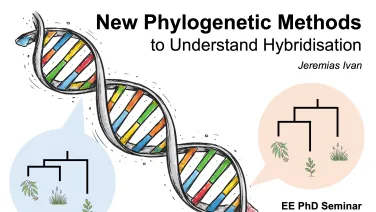Joint PS and E&E Seminar: The Secret Dialogue of Plants: Breaking the Mold
Plants synthesize an amazing diversity of volatile organic compounds (VOCs) that facilitate interactions with their environment, ranging from attracting pollinators and seed dispersers to protecting themselves from pathogens, parasites, and herbivores.
Speakers
Content navigation
Description
ABSTRACT
Plants synthesize an amazing diversity of volatile organic compounds (VOCs) that facilitate interactions with their environment, ranging from attracting pollinators and seed dispersers to protecting themselves from pathogens, parasites, and herbivores. Plants are also targets of released compounds as a part of plant-plant communication, as well as plant-insect and plant-microbe interactions. They are constantly exposed to atmospheric VOCs and can differentiate and respond to specific cues. Therefore, VOC release from the cell and perception of emitted volatiles are essential parts of information exchange. The presented results will cover the different aspects of VOC emission, including the roles of transporters, lipid transfer proteins, and lipid droplets in VOC trafficking out of the cell, and the function of the cuticle as an integral member of the overall VOC biosynthetic network. This presentation will also discuss the latest knowledge about VOC perception, ranging from the inter-organ aerial transport of VOCs via natural fumigation and the hormone-like function of terpenoid compounds to the signaling pathway(s) involved.
BIOGRAPHY

Natalia Dudareva is a Distinguished Professor in the Department of Biochemistry and the Director for the Center for Plant Biology at Purdue University in West Lafayette, Indiana. She received her M.S. in Biology and Biochemistry from Novosibirsk State University, Russia, and her PhD at the Institute of Biochemistry, Kiev, Ukraine and the University of Louis Pasteur, Strasbourg, France. Research in the Dudareva laboratory focuses on understanding biochemical and molecular mechanisms that control the formation of primary and secondary (phenylpropanoid and terpenoid) metabolites in plants, using the power of genetic and biochemical approaches combined with metabolic flux analysis and modeling. Dr. Dudareva has published over 170 papers, 28 book chapters, and three books, and has given more than 230 invited lectures at conferences and other universities. Recent work from her lab appears in Science (Stirling et al., 2024; Adebesin et al., 2017), Nature Communications (Liao et al., 2023; Huang et al., 2022; Qian et al., 2019), Nature Chemical Biology (Weng et al., 2021; Liao et al., 2021; Lynch et al., 2020; Boachon et al., 2019), and Nature Plants (Henry et al., 2018).
Location
Please note: this seminar will be held in the Eucalyptus Seminar Room and via Zoom, details are included below.
Eucalyptus Seminar Room, S205,
Level 2, RN Robertson Bldg (46)
Please click the link below to join the webinar:
https://anu.zoom.us/j/87615743475?pwd=Nbz9Hzoo1F97BdJa6T2XRPtXmQHtIM.1
Webinar ID: 876 1574 3475
Passcode: 931153
Canberra time: please check your local time & date if you are watching from elsewhere.


